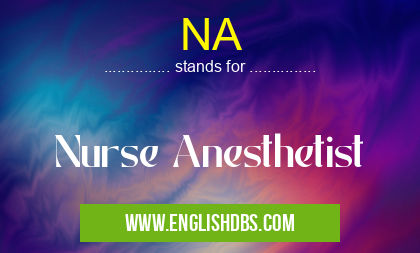What does NA mean in HOSPITALS
Nurse Anesthetists, also known as Certified Registered Nurse Anesthetists (CRNAs), are highly trained and skilled professionals who provide a wide range of anesthesia in hospitals and other healthcare settings. These clinicians play an integral role in patient care, and their expertise is essential to the safe and effective delivery of anesthesia services. The title “CRNA†is an abbreviation for Certified Registered Nurse Anesthetist, which reflects the advanced training these professionals have obtained in order to become certified.

NA meaning in Hospitals in Medical
NA mostly used in an acronym Hospitals in Category Medical that means Nurse Anesthetist
Shorthand: NA,
Full Form: Nurse Anesthetist
For more information of "Nurse Anesthetist", see the section below.
What is Nurse Anesthetist?
The practice of nurse anesthesia involves administering anesthesia to patients prior to surgery or other medical procedures so that they remain pain-free during treatment. CRNAs are responsible for determining the types and doses of anesthesia needed for each patient based on factors such as age, health condition and type of procedure being performed. In addition to providing general anesthetic agents, these experts also specialize in areas such as epidural, spinal or caudal blocks, local infiltration techniques and conscious sedation.
Benefits of Hiring a Nurse Anesthetist
CRNAs provide a cost-effective means for providing safe, high-quality anesthesia care by reducing the need for more expensive physician anesthesiologists in certain situations. By reducing overhead costs associated with paying multiple providers, CRNAs can help free up resources while still delivering quality care. Additionally, due to their extensive training in both medicine and nursing science, CRNAs are able to provide comprehensive preoperative assessments of patients which can aid in avoiding potential complications during surgery or procedures.
Essential Questions and Answers on Nurse Anesthetist in "MEDICAL»HOSP"
What is a Nurse Anesthetist?
A nurse anesthetist is a registered nurse who has received advanced training and education in the field of anesthesia. They are dedicated to providing safe, effective, patient-focused anesthesia care before, during, and after surgical procedures.
What kind of education does a Nurse Anesthetist require?
Nurse anesthetists require at least a master's degree from an accredited program that includes classroom instruction, clinical rotations and a final thesis or project. They must also be certified through the National Board of Certification & Recertification for Nurse Anesthetists (NBCRNA).
How long does it take to complete the certification process?
The certification process usually takes around two years to complete. During this time, nurse anesthetists must acquire clinical experience through supervised practice in a range of environments such as operating rooms, ICUs, labor and delivery units and outpatient surgery centers.
What types of responsibilities do Nurse Anesthetists have?
Nurse anesthetists are responsible for administering local or general anesthesia depending on the medical procedure being performed. They also monitor patient vital signs throughout the procedure and manage any potential complications related to the patient's response to anesthesia.
What type of salary can I expect as a Nurse Anesthetist?
According to the Bureau of Labor Statistics, nurse anesthetists earn an average annual salary of $175,000. This number can vary depending on location as well as stage in career progression. Those who specialize in certain areas may also receive additional compensation for their expertise.
Is being a Nurse Anesthetist dangerous?
While there are certainly risks associated with administering anesthesia to patients undergoing medical procedures, nurse anesthetists are trained extensively throughout their careers in order to minimize those risks and ensure positive outcomes for all parties involved.
Does working as a Nurse Anesthetist involve long hours?
As with many medical professions, nurse anesthetists may be required to work long hours depending on hospital or clinic demands. It is important for them to adhere strictly to protocols related to rest periods and ensure that they receive adequate rest between shifts in order to maintain safety standards.
What type of personality traits help you excel as a Nurse Anethesitst?
To excel in this profession one should possess qualities such as patience, empathy for patients going through difficult medical procedures; strong attention-to-detail; good decision-making skills; excellent communication abilities; ability to handle stressful situations calmly; thorough knowledge regarding anatomy and physiology; flexibility according changes in workloads; physical dexterity needed when carrying out tasks such as setting up intravenous lines etc..
Final Words:
In summary, CRNAS are highly-skilled anaesthetists that are invaluable in providing safe and effective patient care within any healthcare setting requiring anesthesia services. By freeing up resources associated with physician anesthesiologists while still delivering quality care, nurse anesthetists make a crucial contribution to modern medicine.
NA also stands for: |
|
| All stands for NA |
